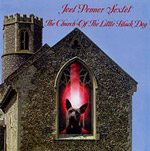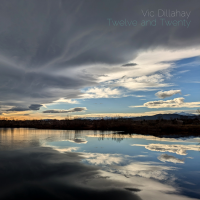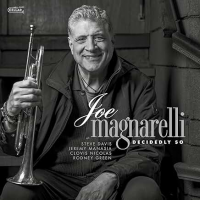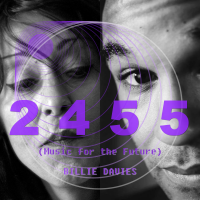Home » Jazz Articles » Multiple Reviews » Three Legacy Compilations: Hancock, Benson, Duke
Three Legacy Compilations: Hancock, Benson, Duke
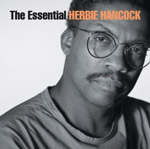 Herbie Hancock
Herbie Hancock
The Essential Herbie Hancock
Columbia/Legacy
2006
Watermelon Man starts off this highly recommended collection of Herbie Hancock essentials. When you stop to think about the trials that we've faced through the years and how much this particular recording has done for us, it's hard to find sufficient words to show thanks. Hancock, Freddie Hubbard, Dexter Gordon, Butch Warren and Billy Higgins were always there for us, through thick and thin, with this memorable interpretation. It's always been there to turn to when we needed a little help from our friends. Several other selections from this retrospective compilation extend a similar message.
Hancock's career flows through phases. In his informative liner notes, Bob Belden points out that those phases simply followed developments that were being made in the popular music world. His view of modern jazz was never compromised. His formats were simply adjusted to suit fresh ideas that came upon the composer naturally. This compilation takes us through Hancock's versatile ensembles, including Mwandishi, the Headhunters, V.S.O.P. and Rockit.
Eight of the tracks on The Essential Herbie Hancock are duplicates from Columbia/Legacy's 2002 box set The Herbie Hancock Box. In a special appearance, the pianist teams up with Stevie Wonder for "St. Louis Blues, which they recorded in June 2000 with bassist Alex Al and drummer Teri Lyne Carrington. On it, both veterans of the jazz/blues/pop world soar with a hip attitude. Wonder sings and plays harmonica in a saucy interpretation that features some of Hancock's hippest piano work.
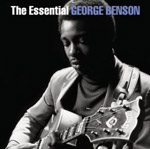 George Benson
George Benson
The Essential George Benson
Columbia/Legacy
2006
Big bad George Benson has always remained closely associated with the blues. As this recommended collection begins with a live appearance he made in 1963 with Brother Jack McDuff and Red Holloway, you can feel the vibes taking effect. Bebop, blues, and ballads were a strong emphasis on his earlier quartets. Through the 1960s, Benson's guitar can be heard with organ, drums, and saxophone expressing mainstream ideas with a creative touch. His fluid cascades and intuitive slides gave each message a powerful twist. His early vocals, represented here by "A Foggy Day, were already solidly immersed in the realm of pop music.
Extended interpretations of "Paraphernalia with Miles Davis & Wayne Shorter and "Sugar with Stanley Turrentine & Freddie Hubbard brought out some of the guitarist's most natural work. Then came the '70s. Things started to change. Popular songs such as "California Dreamin', "White Rabbit, "This Masquerade and "On Broadway gave Benson wide commercial success. It sounded right, it appealed to a broad audience, and it worked out well. So why not do it? He moved forward, followed the trail, and eventually became immersed in disco, funk, and smooth jazz for keeps.
Take Five, from 1974's Bad Benson, finds the guitarist out in front of a large studio orchestra, burning up the frets with a timeless show of technical prowess. His interpretation includes an exciting solo section from pianist Kenny Barron as well as a multitude of adventure from Benson's guitar. "Summertime, from 1977's George Benson in Concert, features the leader's vocal interpretation in a live performance at Carnegie Hall. While the arrangement comes laden with strings and a throbbing electric bass, Benson's emotional vocal interpretation carries much strength. He adds his trademark guitar/vocal unison at midstream, giving the audience a big thrill. The compilation closes with a 1981 recording of "Gotham City that partners Benson with Dexter Gordon, Cedar Walton, Percy Heath and Art Blakey in a genuine, straight-ahead jam session that swings unmercifully.
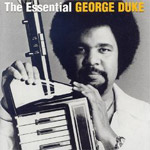 George Duke
George Duke
The Essential George Duke
Columbia/Legacy
2006
George Duke's recording years with Epic Records began in the late '70s when disco was already in vogue. He wrote funk and rock anthems that carried his music to a large audience. Basically, he eschewed jazz in favor of a mesmerizing dance groove that captivated a specific audience. While jazz fusion of that era incorporated improvisation into its format, Duke's music traveled specifically along a pop music trail that featured romantic vocals with backup singers, backbeats, and programmed rhythmic strides. For many of his Epic albums he assumed the role of a casual character who spoke to his audience while the music droned on and maintained a friendly patter throughout. This brought a personal touch to just about everything he created.
A veteran of the big bands of Gerald Wilson and Don Ellis earlier on, Duke already knew the value of innovation. He'd been conservatory-trained and had paid his dues with jazz veterans Bobby Hutcherson and John Heard. His move to electronic keyboards followed the jazz fusion movement when he and Jean-Luc Ponty joined Frank Zappa in 1970. By the late '70s and early '80s, however, Duke was completely immersed in the electronic funk scene with music that appealed to large pop audiences and was ultimately responsible for the proliferation of rap.
The best selections come from his album A Brazilian Love Affair and several collaborations with Stanley Clarke. With Brazilian music, Duke's keyboards were able to emulate instruments of every timbre, and he combined his melodies with wordless vocals and a light samba rhythm. "Up from the Sea it Arose and Ate Rio in One Swift Bite incorporates a rich carnival celebration into its up-tempo fire and features an exciting piano improvisation. His collaborations with Stanley Clarke found widespread acceptance in the same manner that Michael Jackson would. It was fun, and it lasted.
Tracks and Personnel
The Essential Herbie Hancock
Track Listing: Watermelon Man; 'Round Midnight; Cantaloupe Island; Maiden Voyage; Circle; The Sorcerer; Tell Me a Bedtime Story; Hidden Shadows; Chameleon; Joanna's Theme; Butterfly; People Music; Milestones; 4 A.M.; Come Running to Me; Finger Painting; Stars in Your Eyes; Rockit; St. Louis Blues; Manhattan.
Personnel: Herbie Hancock: piano, electric piano, keyboards, synthesizer, vocoder, vocals, background vocals; Ron Carter, Butch Warren, Buster Williams, Alex Al: bass; Jaco Pastorius, Bill Laswell, Paul Jackson, Freddie Washington: electric bass; Billy Higgins, Roy McCurdy, Tony Williams, Teri Lyne Carrington, James Levi, Mickey Roker, Harvey Mason, Mike Clark, Albert "Tootie Heath: drums; Alphonse Mouzon: drums, keyboards; Billy Hart: drums, percussion; Bill Summers, Sheila Escovedo: percussion; Raul Renkow: congas; Daniel Ponce: bata; Baba Duru: tabla; "Wah Wah Watson: guitar; Freddie Hubbard: trumpet, cornet; Miles Davis, Eddie Henderson: trumpet; Thad Jones, Johnny Coles: flugelhorn; Garnett Brown: trombone; Peter Phillips: bass trombone; Bennie Maupin: soprano saxophone, tenor saxophone, bass clarinet, saxello, alto flute; Julian Priester: alto saxophone; Dexter Gordon, Sonny Rollins, George Coleman, Wayne Shorter: tenor saxophone; Joe Henderson: tenor saxophone, flute; Jerry Dodgion: alto flute; Patrick Gleason, Michael Beinhorn: synthesizer; Grand Mixer D.S.T.: turntable; Greg Walker: vocals; Stevie Wonder: vocals, harmonica; others.
The Essential George Benson
Track Listing: Rock Candy; Shadow Dancers; Clockwise; Willow Weep for Me; A Foggy Day; The Borgia Stick; Paraphernalia; Sugar; So What; Ode to a Kudu; California Dreamin'; White Rabbit; Body Talk; Take Five; Summertime; Breezin'; This Masquerade; On Broadway; Give Me the Night; Hip Skip; Gotham City.
Personnel: George Benson: guitar, vocal; Herbie Hancock, Harold Mabern, Kenny Barron, Cedar Walton: piano; Brother Jack McDuff, Butch Cornell, Clarence Palmer: organ; Jan Hammer: keyboards; Jorge Dalto: electric piano, clavinet, piano, keyboards; Lonnie L. Smith, Jr.: electric piano, organ; Ronnie Foster: electric piano, Mini-moog synthesizer; Richard Tee: synthesizer bass; Michael Boddicker: synthesizer; Ronnie Boykins, Gary King, Abraham Laboriel, Paul Jackson, Stanley Banks, Will Lee, Percy Heath, Ron Carter: bass; Art Blakey, Joe Dukes, Montego Joe, Harvey Mason, Steve Gadd, Billy Cobham, John Robinson, Jimmy Lovelace, Jack DeJohnette, Billy Kaye, Tony Williams: drums; Richard "Pablo Landrum: congas; Phil Kraus: vibraphone, percussion; Airto Moreira: percussion, vocal; Paulinho da Costa, Ralph MacDonald, Mobutu: percussion; Earl Klugh, Lee Ritenour, Jay Berliner: guitar; Phil Upchurch: guitar, bass; Larry Williams, Ray Beckinstein, Al Regni, Phil Bodner, Hubert Laws, George Marge, Romeo Penque, Jane Taylor, Kim Hutchcroft, Frank Foster, Red Holloway, Wayne Shorter, Michael Brecker, Dexter Gordon, Stanley Turrentine, Ronnie Cuber: reeds; Miles Davis, Freddie Hubbard, Jerry Hey, Alan Rubin, John Frosk, Jon Faddis, John Gatchell, Joe Shepley, Waymon Reed: trumpet; Gerald Chamberlain, Dick Griffin, Warren Covington, Garnett Brown: trombone; Wayne Andre: trombone, baritone horn; Paul Faulise: bass trombone; Jim Buffington, Brooks Tillotson: French horn; Seymour Barab, Frank Levy, Jesse Levy, Charles McCracken, Alan Shulman, Paul Tobias: cello; Margaret Ross, Gloria Agostini: harp; Patti Austin, Diva Gray, Jocelyn Brown, Tom Bahler, Jim Gilstrap: background vocals; others.
The Essential George Duke
Track Listing: Scuse Me Miss; Reach For It; Starting Again; Dukey Stick; Movin' On; Party Down; Say That You Will; Funkin' for the Thrill; Summer Breezin'; Cravo e Canela; Up From the Sea It Arose and Ate Rio in One Swift Bite; Brazilian Love Affair; Every Little Step I Take; I Want You for Myself; Sweet Baby; I Just Want to Love You; You; Shine On; Ride On Love; Son of Reach For It; Every Reason To Smile; Heroes; The Good Times; Overture; Reach Out; Give Me Your Love; Silly Fightin'; Got To Get Back To Love; She Can Wait Forever; Secret Rendezvous; Mothership Connection; Dukey Stick 12 ; Reach Out! 12 .
Personnel: George Duke: keyboards, vocals; Byron Miller: bass; Leon "Ndugu Chancler, Ricky Lawson: drums; Charles Icarus Johnson: guitar; Sheila Escovedo: percussion, vocals; Josie James, Lynn Davis, Napoleon Brocks: vocals; others.
Visit Herbie Hancock, George Benson and George Duke on the web.
Tags
PREVIOUS / NEXT
Support All About Jazz
 All About Jazz has been a pillar of jazz since 1995, championing it as an art form and, more importantly, supporting the musicians who make it. Our enduring commitment has made "AAJ" one of the most culturally important websites of its kind, read by hundreds of thousands of fans, musicians and industry figures every month.
All About Jazz has been a pillar of jazz since 1995, championing it as an art form and, more importantly, supporting the musicians who make it. Our enduring commitment has made "AAJ" one of the most culturally important websites of its kind, read by hundreds of thousands of fans, musicians and industry figures every month.


